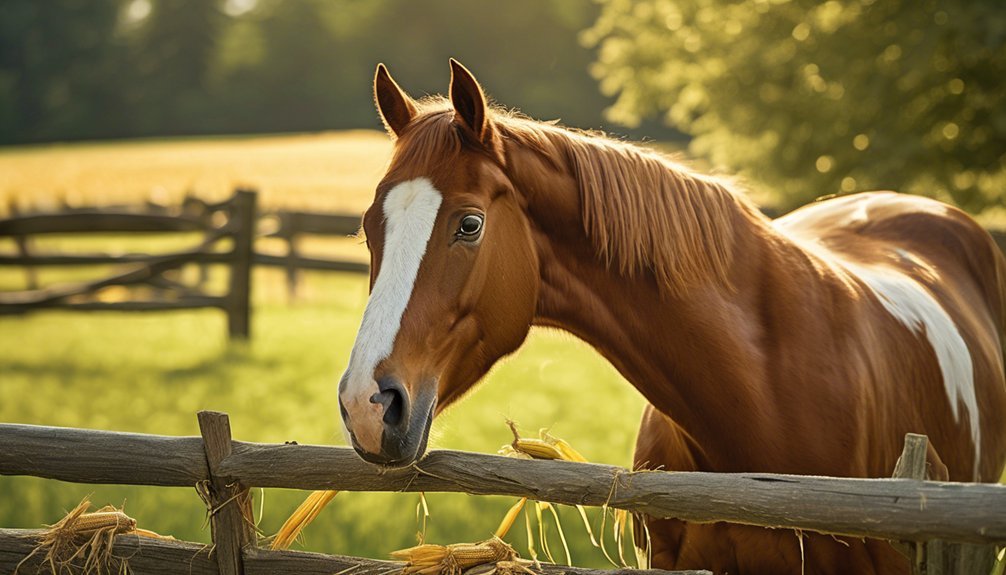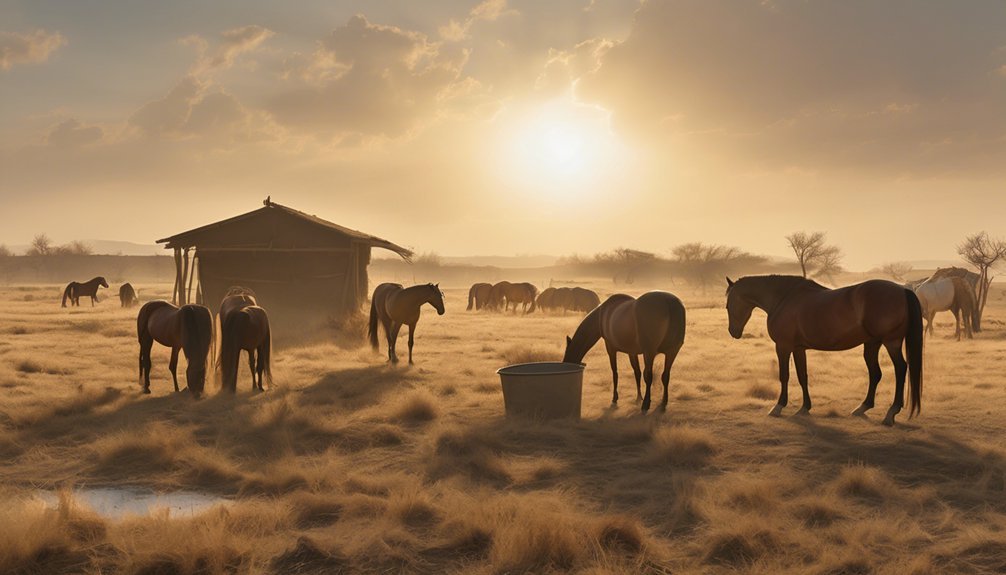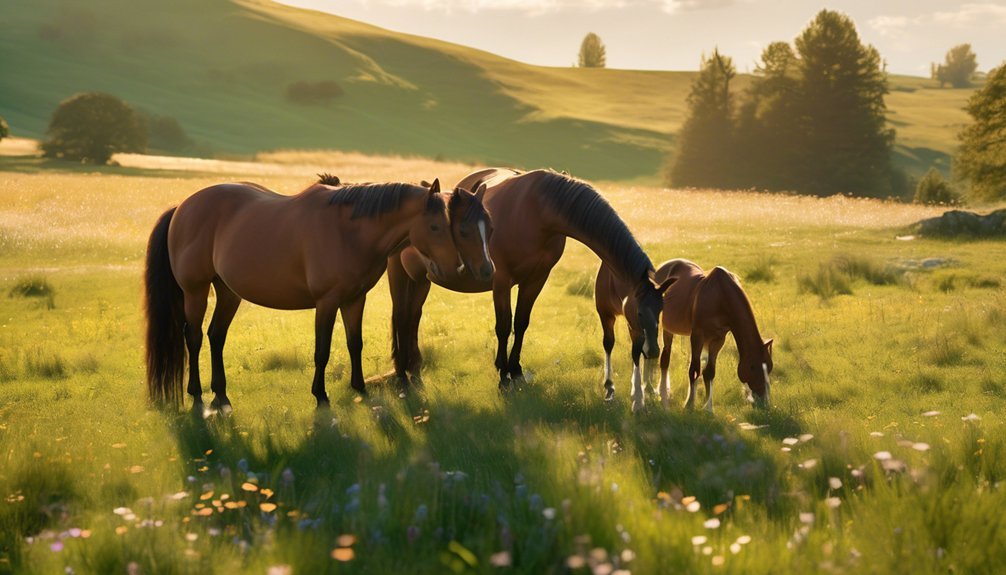
Studies show that corn can provide horses with a significant energy boost, thanks to its high starch content. While this can enhance a horse's performance, it also raises concerns about potential digestive issues. Understanding the balance between energy needs and digestive health is crucial. So, how do you know the right amount of corn for your horse? Let's explore the nutritional profile of corn and its implications for equine diets.
Key Takeaways
- Horses can eat corn as it provides a high-energy source and essential nutrients beneficial for performance and stamina.
- Gradual introduction of corn is crucial to prevent digestive issues like colic or laminitis.
- Corn should be balanced with other feed to maintain optimal starch levels and overall digestive health.
- Alternatives to corn, such as oats and beet pulp, can provide energy without the risks associated with high starch content.
- Regular monitoring of the horse's weight and health is essential when including corn in their diet.
The Nutritional Profile of Corn

Corn, a staple in many diets worldwide, boasts a unique nutritional profile that makes it a significant energy source.
When considering corn varieties, you'll find they differ in nutrient composition, impacting their suitability for horses. Yellow corn, for instance, is rich in carbohydrates and provides essential vitamins, while white corn tends to have fewer nutrients but still offers energy.
The protein content varies, with some varieties containing higher levels of amino acids, crucial for muscle maintenance. Additionally, corn contains fiber, which supports digestive health.
Understanding these differences can help you choose the right type of corn for your horse's diet, ensuring they receive optimal nutrition while enjoying the benefits of this versatile grain.
Understanding Starch and Its Role in a Horse's Diet
Starch serves as a crucial energy source in a horse's diet, influencing their overall health and performance. Understanding starch sources is essential for optimizing equine digestion. Horses primarily derive starch from grains and legumes, with corn being a notable option. However, the way starch is processed in their digestive system can affect nutrient absorption and energy release.
| Starch Source | Digestibility |
|---|---|
| Corn | High |
| Oats | Moderate |
| Barley | Variable |
When you choose starch sources for your horse, consider their individual needs and activity levels. Balancing starch in their diet can enhance their energy levels while maintaining digestive health. Always consult with a veterinarian for personalized guidance.
The Benefits of Feeding Corn to Horses

When choosing a suitable grain for your horse, corn often stands out due to its high digestibility and energy content.
The corn benefits include providing a concentrated source of carbohydrates, which can be crucial for horses engaged in heavy work or competition. This energy-rich grain helps maintain stamina and performance, ensuring your horse stays active and healthy.
Additionally, corn is relatively palatable, making it easier for picky eaters to accept. It also contains essential nutrients like vitamins and minerals that contribute to overall well-being.
Incorporating corn into your horse's diet can enhance equine energy, helping them thrive in their daily activities. Just remember to introduce it gradually to avoid any digestive issues.
Potential Risks Associated With Corn Consumption
Although corn can offer several benefits, it's essential to be aware of the potential risks associated with its consumption. One significant concern is corn toxicity, which can occur if horses consume excessive amounts or if the corn is contaminated with mold. This toxicity can lead to severe health issues.
Additionally, corn is high in starch, which may cause digestive issues such as colic or laminitis if introduced too quickly or fed in large quantities. Monitoring your horse's response to corn is crucial; any signs of discomfort or unusual behavior should prompt immediate attention.
Balancing corn in your horse's diet while being mindful of these risks can help ensure their overall well-being.
How Much Corn Is Safe for Horses?

Determining how much corn is safe for horses requires careful consideration of their individual dietary needs and health status. Generally, you should limit corn serving sizes to about 0.5 to 1 pound per day for an average horse. Monitoring your horse's response is essential.
Here's a simple guide to corn serving sizes:
| Horse Weight (lbs) | Corn Serving Size (lbs) |
|---|---|
| 800 | 0.5 |
| 1000 | 1 |
| 1200 | 1.5 |
| 1400 | 2 |
| 1600 | 2.5 |
Adhering to safe feeding practices, including gradual introduction and observation for any adverse reactions, will help you manage corn in your horse's diet effectively.
Alternatives to Corn in Equine Diets
Exploring alternatives to corn in equine diets is essential for maintaining a balanced and healthy nutrition plan for your horse.
Oats alternatives, like barley and quinoa, provide digestible energy without the high starch content found in corn. These grains can promote healthy gut function and steady energy levels.
Additionally, beet pulp is a fantastic option, offering both fiber and energy while being low in sugar. This digestible fiber source supports gut health and can help prevent issues related to high starch diets.
By incorporating these alternatives, you can ensure your horse receives the nutrients they need while minimizing any risks associated with corn.
Always consult with a vet or equine nutritionist to tailor the best diet for your horse's unique needs.
Signs of Corn Sensitivity in Horses

Identifying signs of corn sensitivity in horses is vital, especially if you've recently replaced or added corn to their diet.
Watch for symptoms like excessive gas, bloating, or loose stools, which may indicate digestive issues stemming from corn allergies.
You might notice your horse being more irritable or displaying changes in behavior, such as increased nervousness or aggression.
Frequent colic episodes can also be a red flag.
If your horse develops skin irritations or hives, corn could be the culprit.
Pay attention to any shifts in appetite; a horse that suddenly refuses to eat might be experiencing discomfort related to its diet.
Monitoring these signs can help you ensure your horse stays healthy and happy.
The Impact of Processing on Corn's Nutritional Value
While processing methods can significantly alter corn's nutritional profile, understanding these changes is crucial for optimizing your horse's diet. Whole corn retains its fiber, promoting digestive health, but processing can enhance nutrient absorption and feeding efficiency. However, it may also lead to nutritional degradation of vital elements.
Here's a quick comparison of whole versus processed corn:
| Aspect | Whole Corn | Processed Corn |
|---|---|---|
| Energy Content | Moderate | Higher |
| Fiber Retention | High | Lower |
| Digestive Impact | Slower digestion | Faster digestion |
| Nutrient Absorption | Lower | Higher |
Choosing the right type of corn can balance energy needs and digestive health for your horse.
Expert Opinions on Feeding Corn to Horses

Veterinarians and equine nutritionists often emphasize the importance of evaluating corn's role in a horse's diet, as opinions can vary significantly based on individual horse needs and health conditions.
Some experts argue that corn can be a beneficial energy source when properly processed, as it aids in corn digestion and supports equine metabolism.
However, others caution against its high starch content, which can lead to digestive issues, especially in horses prone to laminitis or metabolic disorders.
It's crucial to consider each horse's unique requirements and monitor their response to corn. Consulting with a knowledgeable professional can help you make informed decisions, ensuring your horse's health and well-being are prioritized in their feeding regimen.
Making the Right Feeding Choices for Your Horse
When choosing the right feed for your horse, understanding their specific nutritional needs is essential for maintaining optimal health and performance.
Implementing ideal feeding practices helps you ensure your horse thrives. Consider these key factors:
- Assess your horse's age, activity level, and health status.
- Explore safe grain alternatives, like oats or barley, to reduce starch intake.
- Balance hay and concentrate to meet energy and nutrient requirements.
- Monitor your horse's weight and adjust feeding accordingly.
Frequently Asked Questions
Can Horses Eat Corn Husks or Cobs?
You can offer corn husks to your horse for fiber benefits, but be cautious with corn cobs. Horses might struggle with digestion, leading to potential blockages. Always introduce new foods gradually to ensure their well-being.
How Does Corn Affect a Horse's Behavior?
If corn's in your horse's diet, you might witness behavior changes like energy spikes or irritability. Corn digestion can upset their system, leading to unpredictable actions that could surprise even the most experienced horse owner.
Is Corn Suitable for All Horse Breeds?
Corn isn't suitable for all horse breeds due to varying nutritional needs. Some breeds might thrive on its energy, while others could face digestive issues. Always consider your horse's specific requirements before adding corn to their diet.
Can Corn Cause Allergies in Horses?
Yes, corn can cause allergies in horses. You might notice corn allergy symptoms like itching or digestive issues. Monitoring your horse's equine digestive health is crucial, especially if you suspect a reaction to corn in their diet.
What Are the Signs of Corn Toxicity in Horses?
If corn toxicity strikes your horse, you might notice signs like colic, severe diarrhea, or even lethargy. Stay vigilant—monitoring your horse's health can help prevent these alarming symptoms from escalating into serious issues.
Conclusion
In conclusion, while you might think feeding your horse corn is a straightforward way to boost energy, it's actually a balancing act. Too much starch can turn your spirited steed into a colicky mess. So, as you ponder whether to toss that corn into the feed bin, remember: moderation is key. Consult with your vet, monitor your horse's response, and you'll find that the road to a healthy diet is paved with careful choices, not reckless feeding.





